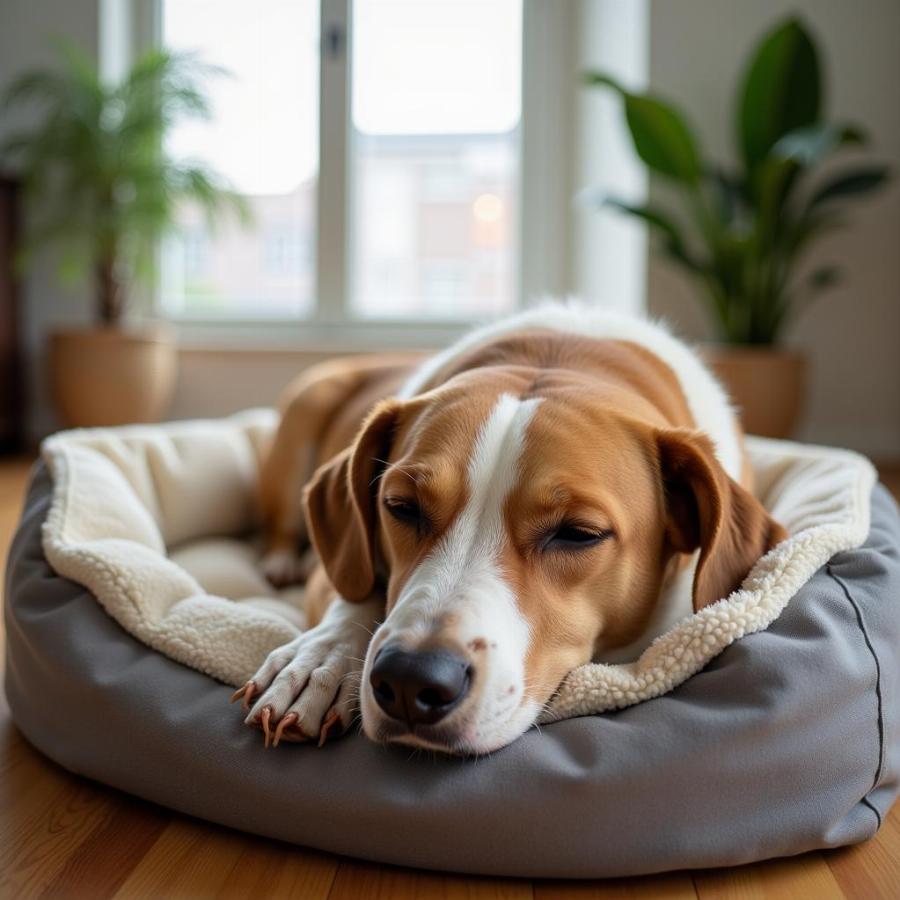Dog panting in sleep can be concerning for owners. Is it normal? Is my furry friend okay? This article delves into the reasons why dogs pant while sleeping, when it’s a cause for concern, and what you can do to ensure your canine companion’s comfort and well-being.
Dogs pant as a way to regulate their body temperature. It’s their primary cooling mechanism, similar to how humans sweat. While panting is commonly associated with physical exertion or hot weather, it can also occur during sleep. This often raises questions and concerns for dog owners. Let’s explore this topic in detail.
Why Does My Dog Pant While Sleeping?
Several factors contribute to dog panting in sleep, ranging from normal physiological responses to underlying health issues.
Dreams and REM Sleep
Just like humans, dogs experience REM (Rapid Eye Movement) sleep, the stage associated with dreaming. During this phase, their breathing and heart rate can fluctuate, and they may exhibit physical movements, including panting. This is generally considered normal and nothing to worry about, especially if the panting is infrequent and short-lived.
Room Temperature
A warm room can easily lead to dog panting in sleep. Dogs are more sensitive to temperature changes than humans, and even a slightly elevated room temperature can make them feel overheated. Ensure your dog’s sleeping area is well-ventilated and at a comfortable temperature. Consider a cooling mat or fan, especially during warmer months.
Anxiety and Stress
Stress and anxiety can also manifest as panting, even during sleep. Changes in routine, loud noises, or separation anxiety can trigger this. aging dog anxiety can be particularly challenging. Creating a calm and secure sleeping environment can help alleviate anxiety-related panting.
When to Worry About Dog Panting in Sleep
While occasional panting in sleep is often harmless, excessive or labored panting can indicate a more serious issue.
Difficulty Breathing
If your dog’s panting is accompanied by wheezing, coughing, or other signs of respiratory distress, it’s crucial to seek veterinary attention immediately. These could be symptoms of respiratory infections, allergies, or even heart problems.
Excessive Drooling and Restlessness
Panting coupled with excessive drooling and restlessness, especially if the dog seems unable to settle down, could indicate pain or discomfort. This warrants a visit to the veterinarian to rule out any underlying medical conditions.
Changes in Behavior
Sudden changes in sleeping patterns, increased panting, or other unusual behaviors should not be ignored. These could be early signs of a health problem and require professional evaluation.
Tips to Help Your Dog Sleep Comfortably
Creating a comfortable and relaxing sleeping environment can help reduce panting in sleep.
- Maintain a cool room temperature: Ensure the room is well-ventilated and not too warm, especially during the summer months.
- Provide a comfortable bed: A supportive and comfortable bed can help your dog relax and sleep soundly. Consider orthopedic beds for older dogs or those with joint issues.
- Establish a consistent bedtime routine: A regular bedtime routine can help your dog feel secure and reduce anxiety. This can include a calming walk, a gentle massage, or simply quiet time together.
 Dog sleeping comfortably
Dog sleeping comfortably
Is My Dog Panting While Sleeping Normal?
Sometimes, yes. If the panting is infrequent and light, and your dog seems otherwise healthy and happy, it’s likely related to dreaming or slight temperature fluctuations. However, consistent, heavy, or labored panting, especially when accompanied by other symptoms, warrants a veterinary check-up. dog breathing fast but not panting while sleeping can also be a cause for concern.
What Can I Do If My Dog is Panting Heavily in Their Sleep?
If you’re concerned about your dog’s panting, it’s always best to err on the side of caution and consult with your veterinarian. They can perform a thorough examination to determine the underlying cause and recommend appropriate treatment. Don’t hesitate to reach out to your vet if you have any concerns about your furry friend’s health. dog close mouth might be a sign of something else entirely.
Conclusion
Dog panting in sleep can be normal or indicative of a health issue. Understanding the potential causes, recognizing warning signs, and creating a comfortable sleeping environment are crucial for responsible dog ownership. By paying close attention to your dog’s behavior and seeking professional advice when necessary, you can ensure your furry companion enjoys restful and healthy sleep. Remember, addressing dog pjs for large dogs won’t solve panting issues. Always consult your vet for health concerns.
FAQ
-
Is it normal for a dog to pant a little while sleeping? Yes, occasional light panting can be normal, especially during REM sleep.
-
When should I be worried about my dog panting in their sleep? If the panting is heavy, frequent, or accompanied by other symptoms like restlessness, drooling, or difficulty breathing.
-
What can I do to help my dog stop panting while sleeping? Ensure a cool, comfortable sleeping environment and address any potential sources of anxiety or stress.
-
Could panting in sleep be a sign of a serious health problem? Yes, it could be a sign of respiratory or heart problems, pain, or other underlying conditions.
-
Should I take my dog to the vet if they are panting in their sleep? If you are concerned, it’s always best to consult with your veterinarian for a professional evaluation.